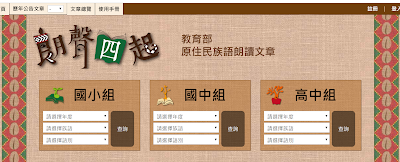Indigenous societies are known as societies without a writing tradition, hence indigenous peoples, the peoples without a history since history bases itself on the study of written sources.
Nevertheless, for centuries across the globe there have been many efforts of creating literacy for oral-based communities.
In Formosa Taiwan, the earliest record of such efforts was found in the 1630s when Dutch predikants introduced Roman letters and taught their Formosan students (of Siraya and Favorlang peoples at least) to spell out their verbal communication in words. Thus, for the first time the world saw Formosan languages in a written form.
Now in the contemporary 21st century, indigenous peoples in Formosa Taiwan have a set of scripts or Roman letters to write with. This set was officially announced by the state in 2005 after much discussion with linguists, educators, preachers, indigenous language teachers and the communities. Since then, there has been a boom of written materials in indigenous languages.
Most of them, supported by the state institutions such as Council of Indigenous Peoples and Ministry of Education, are also available online, such as 'e-Paradise for Indigenous Languages' (http://web.klokah.tw/) and 'Articles Written in Indigenous Languages for Reading Competition' (https://alcd-con.tw/alr/lobby.php).
(Source: klokah)
Among the indigenous languages that has been written and rewritten is the language of my parents and grandparents, Paiwan. vusam (meaning the first seed) is a personal project through which I intend to study, practice, and think about the writing of Paiwan, especially also taking into consideration of the grammar of the language.
Indeed, many writers of Paiwan nowadays speak fluently. Most are retired teachers and Christian ministers who know and actually work with literacy for a living. There is no problem for them to pick up a pen and write down a Paiwan word with Roman letters pursuant to the official set of scripts. The only problem is as they write down what they speak, they tend to disregard grammar and basic writing courtesy like spacing and punctuation. Certainly not on purpose; grammar is a new science for indigenous language users, so is writing itself. It takes time to seep in, and to steep in its anticoloniality.
The writing of Paiwan, as also of other indigenous languages, is still an experiment. It is my belief that rules need to defined and applied consistently in order for Paiwan to be as beautiful in spoken as in written.
Take the following short paragraph 'ku gaku' (My School) from 'e-Paradise for Indigenous Languages' for example.
situ a ken[misspelling: aken].[lack spacing]i dungdung tua gaku a ku tapaw.[lack spacing]djemavadjacac[misspelling: demavadjavac] a ken[misspelling: aken] a sema gaku[misspelling: semagagu for sema is a prefix] a tjumaq a ljemita [missing a case marker 'a'] qadaw.[lack spacing]tjaljiqaca [missing a case marker 'a'] ravac a nia gaku,[wrong punctuation] [lack spacing]tjuruvu a situ katua sinsi.[lack spacing]nananguaqan a nia sinsi.[lack spacing]maciuciur a men[misspelling: amen] a itaqeci a ljemita [missing a case marker 'a'] qadaw,a semenai uta.[lack spacing]ru ikai[misspelling: ruikai for ru is a prefix] a men[misspelling: amen] tua pinayuanan[unnecessary spacing].[lack spacing]na tjenglai[double misspelling: natjengelay for na is a prefix] a ravac a ken[misspelling: aken] tua ku gaku.
When listening, no one who understands Paiwan will miss the meaning. But on paper or in this case on my laptop screen, it hurts my eyes tremendously. It is better to rewrite the whole thing as follows:
situ aken. i dungdung tua gaku a ku tapaw. djemavadjavac aken a semagaku a tjumaq a ljemita a qadaw. tjaljiqaca a ravac a nia gaku; tjuruvu a situ katua sinsi. nananguaqan a nia sinsi. maciuciur amen a itaqeci a ljemita a qadaw, a semenai uta. ruikai amen tua pinayuanan. natjengelay a ravac aken tua ku gaku.
Translation: I am a student. My school is close to my house. I walk to and from school and my house every day. Our school is big; there are many students and teachers. Our teachers are nice. Every day we study and sing. We often speak in Paiwan. I have really liked my school.
This is what I mean by vusam: To Plant the First Seed of Writing Good Paiwan. While the rules may apply to four varieties of Paiwan, my case is strictly Southern Paiwan spoken in Kasuga (Chunre), Sisegu (Shizi), and Sinevaudjan (Mudan).









No comments:
Post a Comment